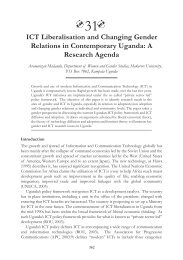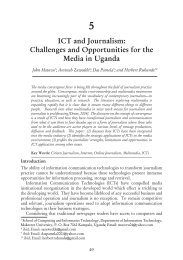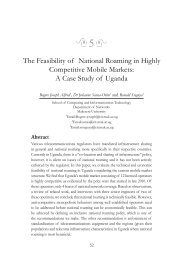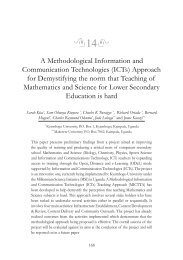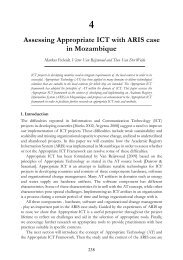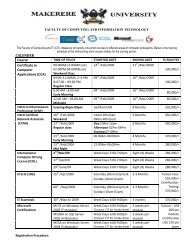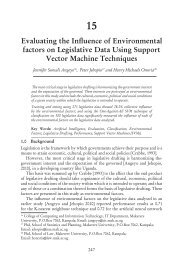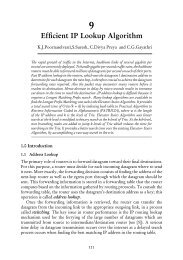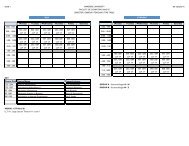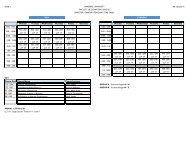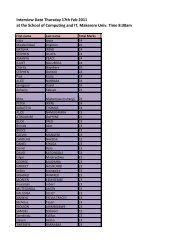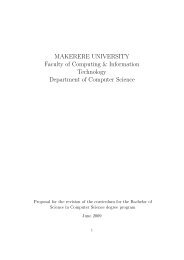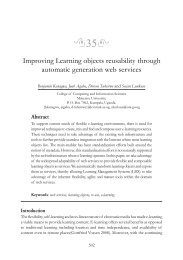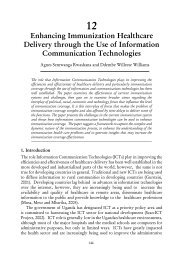Job Mashapa1, Darelle van Greunen2, Alida Veldsman3 and ...
Job Mashapa1, Darelle van Greunen2, Alida Veldsman3 and ...
Job Mashapa1, Darelle van Greunen2, Alida Veldsman3 and ...
You also want an ePaper? Increase the reach of your titles
YUMPU automatically turns print PDFs into web optimized ePapers that Google loves.
96 Strengthening the Role of ICT in Development<br />
failure has been poor management of change in user experience <strong>and</strong> lack of user<br />
involvement right from the onset of project initiation. The purpose of this study is<br />
to propose a theoretical model for managing user experience of the ICT users in the<br />
context of developing countries rural communities. The uniqueness of the proposed<br />
model lies in its user centred approach <strong>and</strong> its applicability in an environment that<br />
is not bound by organisational based visions <strong>and</strong> policies. A study of literature on<br />
the impact of ICTs in rural communities, user experience <strong>and</strong> change management<br />
was used to establish an initial conceptual framework through which the theoretical<br />
model is developed. The proposed model will be empirically validated using a case<br />
study to gain more insights on the model applicability. The focus of this paper is to<br />
investigate what is needed to establish a user centred model for managing change<br />
in the user experience of ICT users. An initial model is discussed followed by the<br />
preliminary fi ndings of a single case pilot investigation.<br />
Keywords: Information Communication Technologies (ICTs); Change Management;<br />
User Experience; Rural Context; Information Communication Technology for<br />
Development.<br />
Introduction<br />
In this paper ICT is defi ned as a system of devices, services <strong>and</strong> applications used to<br />
capture, store, process <strong>and</strong> transmit electronic information. ICT adoption has lead to<br />
the much noticeable discrepancies in average economic growth between the developed<br />
<strong>and</strong> developing countries [Pohjola 2003]. In the developed world ICT has contributed to<br />
economic growth by improving the quality, effectiveness <strong>and</strong> effi ciency <strong>and</strong> information<br />
access [Easterly <strong>and</strong> Levine 2001; Easterly 2001]. In developing countries ICT is being<br />
used as a tool for poverty alleviation <strong>and</strong> as a development enhancer [Yates eta al, 2010;<br />
Donner et al, 2008; Kenny 2002].<br />
There have been some rapid changes <strong>and</strong> improvements in ICT technologies,<br />
diffusion <strong>and</strong> usage [Yusuf 2005]. Traditional computers were used by large organisations<br />
such as governments <strong>and</strong> universities for data, storage, processing <strong>and</strong> automation.<br />
By then the use of computers was far from changing the lifestyles of the people but<br />
rather oriented on a business perspective [Dahlbom <strong>and</strong> Ljungberg, 1998]. With the<br />
progression of time <strong>and</strong> computer penetration, personal computers were introduced<br />
in homes <strong>and</strong> offi ces as sources of information <strong>and</strong> communication. People began to<br />
underst<strong>and</strong> <strong>and</strong> embrace the new technologies leading to a revolutionary wave changing<br />
their life styles, interaction <strong>and</strong> experiences [Sorensen <strong>and</strong> Gibson 2006]. In the current<br />
era, mobile ICTs have gained predominate use mainly because of the fl exibility <strong>and</strong><br />
unconstrained usage with respect to time <strong>and</strong> location [Kushchu <strong>and</strong> Kuscu, 2007; Valk<br />
et al. 2010; S<strong>van</strong>aes et al. 2010].<br />
The rapid inception of new ICTs has not only changed business processes but also<br />
transformed the lifestyles of the people [Trim <strong>and</strong> Sheng 2008]. The transformation is



